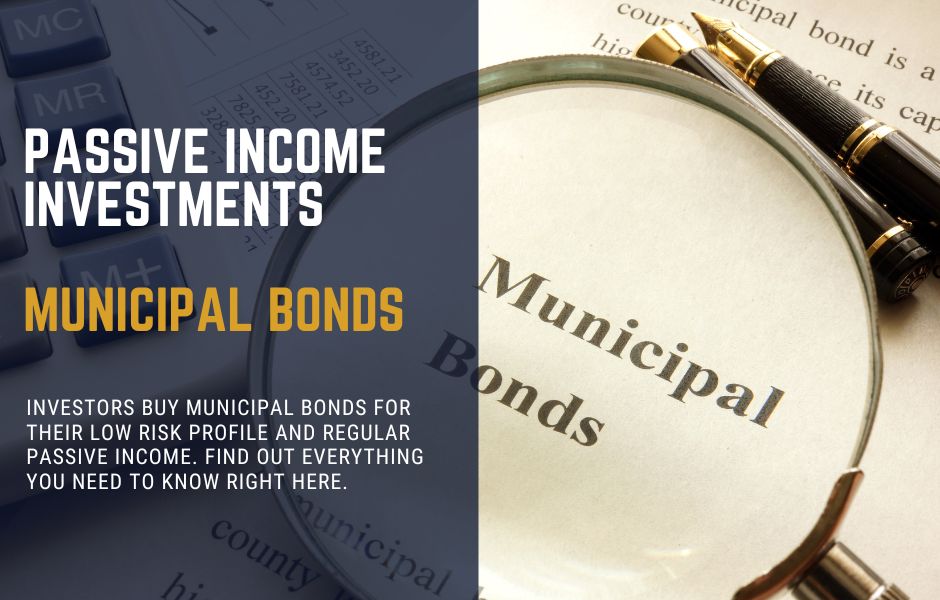Passive Income Investments | Municipal Bonds
Investor Bonus: See new passive income investment recommendations every Thursday
Municipal bonds can be a great passive income focussed investment. In this article you'll learn everything you need to know to get started...

David Garner
Passive Income Investments | Municipal Bonds
When cities, counties, or other local governmental entities need to fund projects like schools, highways, or water treatment facilities, they often turn to the bond market.
One of the most critical components of this market is municipal bonds, commonly referred to as “munis.”
Investors typically buy munis for their low risk profile and regular passive income.
Let’s delve into what these bonds are, their different types, and the rationale behind their popularity among investors.
What Are Municipal Bonds?
Municipal bonds are debt securities issued by state, city, county, or other local governmental entities to finance capital projects.
When you buy a municipal bond, you’re essentially lending money to the issuer in exchange for a promise to receive periodic interest payments and the return of the bond’s face value when it matures.
Types of Municipal Bonds
- General Obligation Bonds (GOs): These are the most common type of municipal bond. They are backed by the full faith and credit of the issuer. This means that the issuing municipality commits to using its tax revenues, or any other source of funds, to repay bondholders. They’re typically used to fund public-purpose projects like schools or parks.
- Revenue Bonds: Unlike GOs, revenue bonds are secured by specific revenue streams. These can be tolls from highways, fees from water utilities, or rents from a housing project. If the project does not generate the expected revenue, bondholders might be at risk of receiving less interest or even losing some of their principal.
- Private Activity Bonds (PABs): These bonds finance projects of a private user, and the principal and interest on them are paid by such private users. However, they are considered municipal bonds since they serve a public purpose, like building a hospital or school.
- Taxable Municipal Bonds: While most municipal bonds are tax-free, some do not qualify for tax-exemption and are thus taxable. These are often used to fund projects that don’t serve a broad public purpose.
Why Do Investors Buy Municipal Bonds?
The main allure of many municipal bonds, especially for investors in higher tax brackets, is that the interest income they generate is often exempt from federal income taxes and sometimes state and local taxes.
This can provide a higher after-tax yield than taxable bonds with similar risk profiles. Additionally, munis have a historical reputation for being relatively safe investments, especially GOs backed by the taxing power of the issuer.
Benefits of Investing in Municipal Bonds
- Tax Advantages: As mentioned, the interest from most municipal bonds is exempt from federal income tax. If the bonds are issued within the investor’s state of residence, they might also be exempt from state and local taxes.
- Diversification: Including municipal bonds in a portfolio can offer diversification benefits, as they may not move in tandem with equities or other bond classes.
- Relatively Low Risk: Municipal defaults are historically infrequent. While not risk-free, they are generally considered safer than corporate bonds.
- Stable Income Stream: For those seeking a steady source of income, especially retirees, the periodic interest payments from municipal bonds can be attractive.
Risks of Investing in Municipal Bonds
- Interest Rate Risk: Like all bonds, munis are susceptible to interest rate fluctuations. When interest rates rise, bond prices fall, and vice versa.
- Credit Risk: Although defaults are rare, they can occur. Revenue bonds, in particular, depend on specific revenue streams, and if these decrease, it could impact the issuer’s ability to meet its obligations.
- Call Risk: Some municipal bonds have call provisions allowing the issuer to repay the bond before its maturity date. If interest rates fall, an issuer might call its bond to issue new bonds at a lower rate, leaving investors with cash they may need to reinvest at lower rates.
- Liquidity Risk: Some municipal bonds might not trade frequently, making them harder to sell at a desired price.
- Tax-Bracket Changes: If an investor’s tax bracket decreases, the tax advantage of municipal bonds might be reduced.
Conclusion
In conclusion, municipal bonds are a staple in the portfolios of many income-focused investors, especially those in higher tax brackets.
However, like all investments, they come with their set of advantages and risks. As always, before making any investment decisions, it’s essential to understand the product thoroughly and consider one’s financial goals and risk tolerance.
More Passive Income Related Articles
- Private Money Lending 101 | How to Earn Passive Income as a Private Money Lender
- Mortgage Note Investing | Earning Passive Income From Private Mortgage Notes
- Performing Mortgage Notes | Everything You Need To Know
- Monthly Income Investments | The Ultimate List of Investments That Pay Passive Monthly Income
- Mortgage Notes For Sale | Where to Find Performing Mortgage Notes For Sale Today
- Passive Income Investments | Royalty Income Trusts
- Passive Income Investments | Business Development Companies (BDCs)
- Passive Income Investments | Master Limited Partnerships (MLPs)
- Passive Income Investments | High Yield Savings Accounts
- Passive Income Investments | Certificate of Deposit (CD)
- Investments That Pay Passive Income | Real Estate Investments Trusts (REITs)
- Investments That Pay Passive Income | Preferred Stocks
- Passive Income Investments | Dividend Index Funds and ETFs


